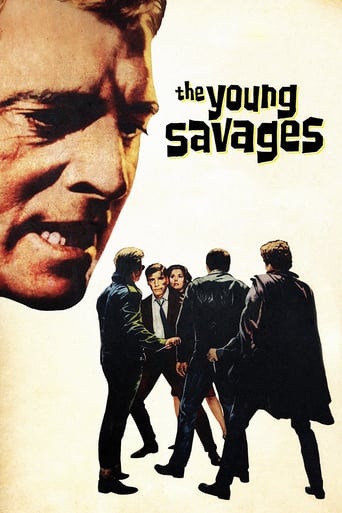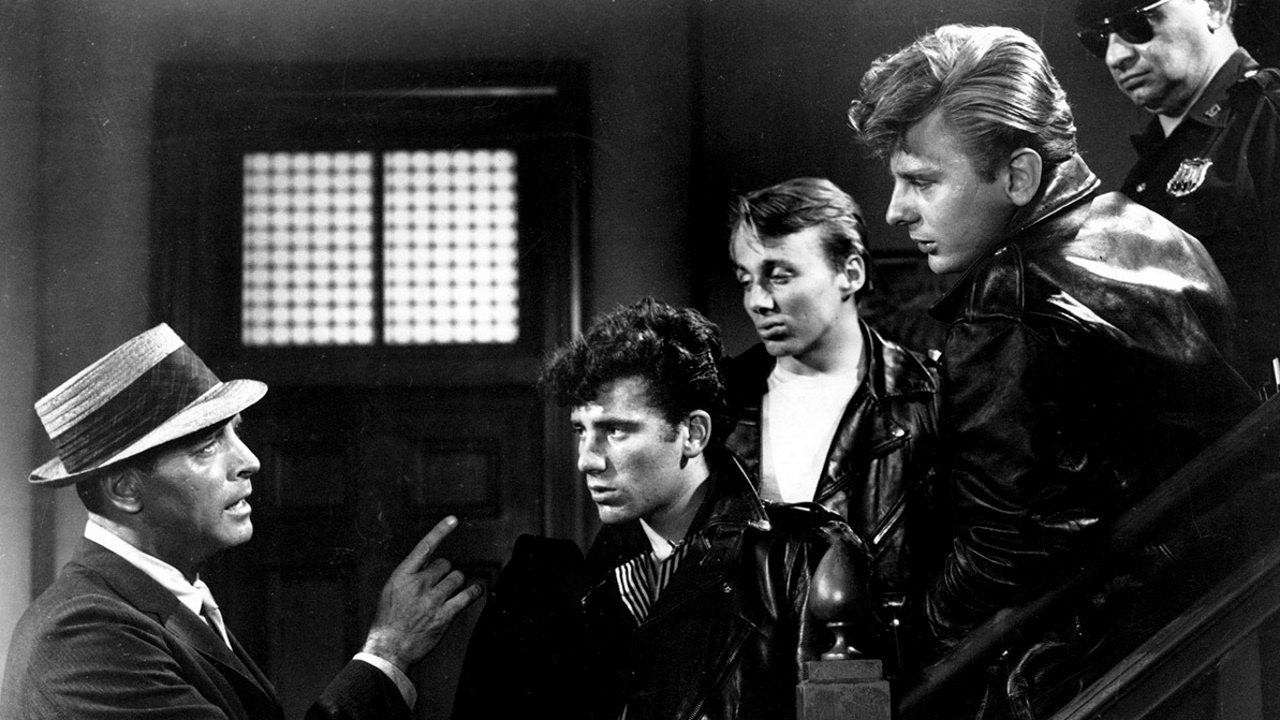skanz
This is quite an entertaining film, and quite slickly done. The opening scene follows three youths that you just know are up to no good. They pull out knives and attack a blind Puerto Rican boy innocently playing a harmonica on his front porch with his sister. A clear case of premeditated murder. The assistant DA is going after the death penalty until he does some digging. It turns out the blind boy is a general in a Puerto Rican gang, and regularly pimps out his 16yo sister for $. This revelation seems to change the mind of the ADA, apparently the blind boy wasn't so innocent after all. Why was this important? It did not change the fact that the 3 went to his house with the specific intention of killing him. If anything it provides motivation. Somehow the blind boy's involvement in gangs meant his life was less valuable. While he has the boy's sister on the witness stand the ADA asks her how she earns money, reminding her she is under oath. The admits she is a hooker. "A prostitute?" the ADA wants clarification."Yes, a prostitute..." The defense attorney objects, but the ADA says he is leading somewhere. But he doesn't- he just lets the jury know she has been a prostitute since the age of 14. The jury is shown wide-eyed. Somehow this is relevant? He asks her if she was coerced into it by an older man. Apparently not, they needed money when her mother got sick. He asked what her mother thought about her being a prostitute, she said the mother wished she had died. Remember this is a witness for the prosecution. This pure 'slut-shaming' at it's best. Moral condemnation.He then goes on to show one of the 3 attackers is mentally challenged, another didn't actually stab the boy, and the third tries to dominate out of fear. essentially he does the defense attorneys job for him. The reasoning given in the film is he wanted to expose THE TRUTH. That truth being that what seems a simple case of good vs evil is more complex- this is all well and good, but there is an underlying message in the film. Initially the three white kids are presented as thoroughly evil bad 'uns. We learn they are complex and disturbed- more deserving of pity than anger. The Puerto Ricans at first seen as innocent victims are finally portrayed as morally corrupt, inferior in every way to the White Man. The blind boy's mother wants justice for her son in the middle of the film, and the ADA promises her she will get it. After he has scuppered his own case, she asks him where is the punishment promised for those that killed he son. He tells her a lot of people killed her son. He implies it was his own fault, her fault, the gang's fault, his own people's fault. He walks away proudly, a job well done. The 3 attackers avoid the death penalty- the mentally challenged one gets sent to a mental hospital, the non-stabber gets a year in juvi, (he's a good kid at heart) and the third gets life in priz. The sentence was probably a good one for the three killers. They were sent to kill the boy by the head of their gang, so although premeditated, they were pawns. There was no mention of pursuing the guy that organised the killing- the Thunderbirds gang leader.The two gangs go back to the status quo, the white middle class ADA, jury, cops and the audience are reassured minorities have no morals and white kids only err through environmental stress.
wwc-johnb
As with all Frankenheimer/Lancaster productions, this is a taut story with first-rate acting. But the outlandish courtroom scenes really let it down.Lancaster's district attorney is more the defense than a prosecutor as he paints the boys as poor, misunderstood victims that society drove to stab the Hispanic blind boy. It would be safe to say that his days as a prosecutor would be over. In fact, there might even be disbarment procedures on the horizon.Frankenheimer should also have consulted with some attorneys to see what actually goes on during a trial. For example, the lab report clearing DePace would have been available to the defense as part of discovery, not something that would be sprung by the prosecutor during cross examination. Similarly, the judge arbitrarily changes DePace's charge from murder one to third degree assault during sentencing, after the jury has already come back with a verdict. Did the jury convict on murder or not? This film puts me in mind of the later Birdman of Alcatraz. This is another taut, well-acted F/L effort in which the life of killer Bob Stroud is completely fabricated to make him appear to be a misunderstood innocent beaten down by the prison system, rather than the conscious less sociopath he was in reality. They even went so far as to get the real bird man a special parole hearing. Fortunately, when asked what he would do if he got out, Stroud answered that he'd kill again because there were too many out there who needed killing. Oops, never mind.
CitizenCaine
During this period, many juvenile delinquent films were released following the Hollywood success of The Blackboard Jungle with Glenn Ford in 1955. The cycle continued into the sixties when the juvenile films often turned soft or zany, such as the beach films. The delinquency films returned to a more hardcore approach with the advent of the motorcycle films from the mid sixties to the early seventies. John Frankenheimer was a director to be reckoned with from the fifties through the mid sixties. In The Young Savages, his second feature film, Frankenheimer directs Burt Lancaster as a crusading assistant district attorney who later finds himself second-guessing himself when prosecuting three Italian gang members for stabbing a blind Puerto Rican boy to death. The role is beneath Lancaster, and it becomes one of his standard portrayals of an intense character in growing conflict with himself over ethical issues. His performance is good, but toward the end of the film in the courtroom scene, Lancaster's character seems to take an about face in relation to his position as a prosecutor and from his earlier get tough approach; as a result, his concluding courtroom speech rings hollow and makes him sound like a political mouthpiece for the screenwriter. The film also glosses over the ethical dilemma of Lancaster prosecuting the son of a former girlfriend.The icy Dina Merrill represents the book-learned liberal faction of society insulated from facing the social problems the establishment attempts to come down on. Shelley Winters is always good, this time as an Italian mother with a son she's disconnected from. Edward Andrews is good as Lancaster's amoral, political boss. Telly Savalas appears in only his second feature film as a rough and tumble police lieutenant, a precursor to his Kojack persona. Luis Arroyo, the one time pitcher from the Yankees at the time, is Zorro (the Puerto Rican gang leader). The Young Savages attempts to do too much in one film, depicting juvenile delinquency as a social problem with varied causes seemingly to be studied and understood. Also the four main characters of Lancaster, Merrill, Winters, and Andrews appear to symbolize the various factions of society with a vested interest in delinquency as an issue; of course a couple are misguided. Neither gang is depicted as all good or all bad. The gang members appear to be acting a bit exaggerated in the film, which may have seemed necessary for the film to make its point, but today the performances simultaneously seem dated, tame, and, in the case of John Davis Chandler, over-the-top. Frankenheimer's early films, as did his early television work, move quickly with tense, emotionally packed scenes. He was also innovative with camera angles and stop action close-ups. The Young Savages benefits immensely from on location shooting in East Harlem neighborhoods where Lancaster grew up himself. The screenplay is based on Evan Hunter's novel: A Matter Of Conviction, the title deliberately ambiguous perhaps. This is probably Frankenheimer's weakest film from his first decade of directing. *** of 4 stars.
MartinHafer
Uggghhh! This movie was perhaps the worst "social commentary" film I have ever seen--much worse than the very, very preachy KNOCK ON ANY DOOR and incredibly embarrassing and completely unbelievable towards the end. It's really a shame, as the first 85% of the film was excellent--offering many different perspectives on how to prosecute young urban hoodlums. Some are pushing for restraint and a liberal approach to the "misunderstood youths" while others are pushing for the "thugs" to get the chair. This debate was worth exploring, though I must admit that at times, the film didn't take a middle ground. And, in a movie full of "black and white thinking", you are left without any real answers--just diatribe and propaganda.However, despite this unevenness, the last 15 minutes or so completely destroyed the film--making it 100% ridiculous and schmaltzy! Instead of pushing for the death penalty (which at least one of the accused CLEARLY deserved or at least 150 years in prison), the District Attorney, in mid-trial, begins campaigning for the Defense!!! And, he concludes by declaring that they are all victims of society and should not face 1st degree murder charges!!!!! If this REALLY happened, the D.A. would most likely be before a disciplinary committee or get sent to a sanitarium! Sure, Burt Lancaster was seeking "truth", but the only truth I saw was a completely one-sided bleeding- heart film that made me want to wretch. DON'T pretend to offer both sides and then conclude the movie with nothing but pure preachy propaganda!! To me, this made the film seem very dishonest and contrived. Avoid this movie and watch most any other courtroom drama!The saddest part of this film is that it was directed by John Frankenheimer. Around this same time period, he gave us some of the greatest films of the 60s (Seven Days in May, The Manchurian Candidate and Seconds). This, on the other hand, was just too cheap and poorly written--why did he agree to do this bad film?!


 AD
AD



